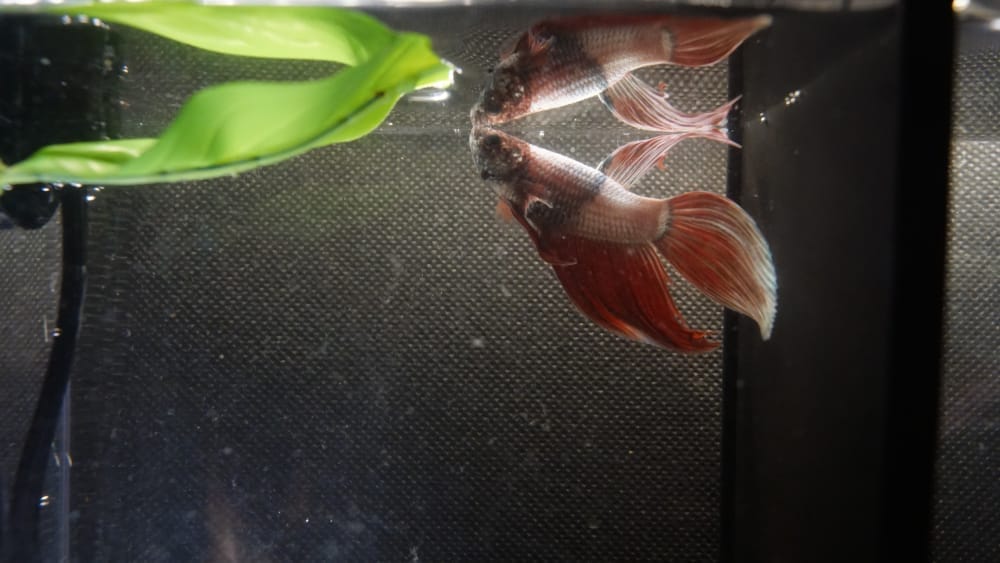This post was created with help from AI tools and carefully reviewed by a human (Muntaseer Rahman) . For more on how we use AI on this site, check out our Editorial Policy.
Check Out These FREE Tools We Made JUST For You!
Winter Betta Fish Care: Temperature, Feeding, and More

Betta fish need extra attention during winter because cold temperatures slow their metabolism, weaken their immune system, and make them vulnerable to disease. The key to winter betta care is maintaining stable water temperature (78-80°F), adjusting feeding amounts, and watching closely for signs of cold stress.
Here’s the thing: bettas are tropical fish from Southeast Asia. They’ve never experienced a real winter in their evolutionary history. Your cozy heated home in January might still be way too cold for them.
This guide covers everything you need to know about keeping your betta healthy through the cold months. You’ll learn how to manage temperature, adjust feeding schedules, prevent winter illnesses, and recognize warning signs before they become emergencies.
Quick Winter Betta Care Checklist
- Keep water at 78-80°F (25.5-27°C) consistently
- Feed smaller portions (metabolism slows in cooler temps)
- Match water change temps exactly to tank water
- Check thermometer daily (heaters can fail in winter)
- Maintain 8-12 hours of light despite shorter days
- Avoid placing tank near cold windows or drafty areas
For specific recommendations, check out our betta fish owner essentials page.
Why winter is hard on betta fish
Bettas are ectothermic, which means they can’t regulate their own body temperature. Their entire metabolism runs on the temperature of the water around them.
When that water gets cold, everything slows down. Digestion. Immune function. Activity levels. Healing.
Room temperature in most homes drops during winter, especially at night. Even if you keep your house at 70°F, that’s still too cold for a betta. And the water in an unheated tank is usually a few degrees cooler than the room.
Cold water stress doesn’t always show up immediately. Your betta might look “fine” for weeks while their immune system quietly weakens. Then one day, they’ve got fin rot, ich, or something worse.
The good news? Winter betta care isn’t complicated. It just requires a bit more attention than the warmer months.
Temperature management in winter
This is the most critical part of winter care. Get the temperature right, and you’ve solved 80% of potential winter problems.
The ideal range
Bettas thrive between 78-80°F (25.5-27°C). This is their sweet spot where metabolism, digestion, and immune function work best.
They can survive in a wider range of 72-86°F, but anything below 76°F puts them in the stress zone. Below 72°F is the danger zone where illness becomes likely.
Why heaters matter more in winter
Your heater has to work harder when room temperatures drop. A heater that kept your tank at 78°F perfectly in summer might struggle in December.
Check your tank temperature every single day during winter. Don’t trust your heater’s dial alone. Use a separate thermometer on the opposite side of the tank.
If your heater can’t maintain temperature, you have a few options:
- Upgrade to a more powerful heater (50W for 5-gallon tanks)
- Add a second backup heater set 2-3 degrees lower
- Insulate the tank with foam or a towel on the back and sides
- Move the tank away from cold walls and windows
- Keep the tank in a warmer room
For specific heater recommendations, check out our betta fish owner essentials page.
Avoiding temperature shock
Temperature shock is one of the biggest dangers during winter. It happens when water temperature changes too quickly, and it can kill a betta fast.
Common causes of temperature shock in winter:
- Water changes with cold tap water
- Heater malfunction (stuck on or stuck off)
- Moving the tank to a different room
- Power outages
Always match replacement water temperature exactly to tank water before adding it. Use a thermometer to check both. Even a 3-4 degree difference can stress your fish.
Feeding adjustments for winter
Cold water slows betta metabolism. If you feed the same amount as summer, your betta can’t digest it properly. Undigested food leads to bloating, constipation, and swim bladder problems.
How to adjust feeding
Reduce portion sizes. If you normally feed 3-4 pellets twice daily, drop to 2-3 pellets once or twice daily during winter. Watch your betta’s belly. It should never look swollen.
Skip a day each week. Fasting one day per week helps bettas fully digest their food and prevents constipation. This is good practice year-round but especially important in cooler months.
Choose easily digestible foods. Small pellets and Bug Bites formula are easier on sluggish digestion. Avoid large pellets or freeze-dried foods that expand in the stomach.
Soak freeze-dried treats first. If you give bloodworms or brine shrimp, soak them in tank water for a few minutes before feeding. This prevents them from expanding inside your betta.
Signs of overfeeding in winter
- Bloated or swollen belly
- Constipation (no waste for days)
- Floating issues or swimming problems
- Leftover food in the tank
- Cloudy water
If your betta seems uninterested in food, don’t worry too much. A healthy betta can go several days without eating. It’s better to underfeed than overfeed during winter.
Water changes in winter
Water changes become trickier in winter because of temperature matching. But they’re just as important as ever.
Temperature matching is critical
This is where most winter water change mistakes happen. You fill a bucket from the tap, dump it in, and suddenly your tank drops 5 degrees.
Always check the temperature of your replacement water before adding it. Mix hot and cold tap water until it matches your tank exactly. A digital thermometer with a probe makes this easy.
How often to change water
Stick to your regular schedule. For a filtered 5-gallon tank, that’s typically 25% weekly. For smaller unfiltered setups, more frequent smaller changes work better.
Because betta metabolism slows in cooler temps, they produce slightly less waste. But don’t use this as an excuse to skip changes. Water quality is even more important when immune systems are already stressed.
Winter water change tips
- Treat replacement water with dechlorinator before adding
- Let treated water sit near the tank to reach room temperature
- Use a thermometer to verify temps match within 1-2 degrees
- Add new water slowly, not all at once
- Consider smaller, more frequent changes to minimize temperature swings
Winter illness prevention
Cold stress weakens immune systems. That’s why winter is prime time for betta diseases like ich, fin rot, velvet, and fungal infections.
Common winter health issues
Ich (white spot disease). Shows up as tiny white dots covering the body and fins. Often triggered by temperature stress. Treat by gradually raising temperature to 82-84°F and using ich medication.
Fin rot. Fins become ragged, frayed, or discolored at the edges. Caused by bacteria that take advantage of weakened immunity. Clean water and stable temps usually resolve mild cases.
Velvet. A parasitic infection that makes your betta look dusty or gold-colored. Very contagious and often triggered by temperature fluctuations.
Lethargy and loss of appetite. Sometimes not a specific disease, just general cold stress. Fix the temperature first before assuming something else is wrong.
Prevention strategies
Maintain rock-solid temperature. This is the number one prevention method. A stable 78-80°F gives your betta’s immune system the best chance.
Keep water pristine. Don’t slack on water changes just because it’s cold outside. Clean water means fewer pathogens.
Avoid stress. Don’t rearrange decorations, add new tankmates, or make major changes during winter. Let your betta conserve energy.
Feed high-quality food. Good nutrition supports immune function. Vary the diet with pellets and occasional frozen treats.
Quarantine new additions. If you’re adding plants or decorations, rinse them well. New items can introduce pathogens that a cold-stressed betta can’t fight off.
Lighting during winter
Shorter days mean less natural light. This matters because bettas need consistent day/night cycles for their circadian rhythm.
Why lighting matters
Bettas are diurnal, meaning they’re active during the day and sleep at night. Without a regular light schedule, their sleep patterns get disrupted. This leads to stress, color fading, and appetite changes.
In their native Thailand, bettas get 10-14 hours of daylight year-round. Your tank should mimic this even when it gets dark outside at 5pm.
Winter lighting schedule
Aim for 8-12 hours of light daily. Consistency matters more than exact hours. Use a timer so the lights turn on and off at the same time every day.
Don’t extend light hours beyond 12 to “make up” for winter darkness. Too much light causes stress and promotes algae growth.
If your tank is near a window, be aware that winter sun is weaker. You may need to rely more on your aquarium light than ambient daylight.
Tank placement in winter
Where your tank sits becomes more important when temperatures drop outside.
Locations to avoid
Near windows. Cold drafts seep through even closed windows. The glass itself gets cold and can chill nearby tank water.
Against exterior walls. These walls are colder than interior walls, especially in older homes.
Near doors. Every time someone opens the door, cold air rushes in.
In basements. Typically the coldest part of the house.
Near heating vents. While warmth sounds good, forced air creates temperature swings.
Better locations
Move your tank to an interior wall in a consistently warm room. Upper floors tend to be warmer than lower floors since heat rises.
If you can’t move the tank, insulate the back and sides with foam board or even a thick towel. This helps retain heat.
Power outage preparation
Winter storms can knock out power. Without electricity, your heater stops working and tank temperature plummets.
Have a plan ready
Insulate immediately. Wrap the tank with blankets, towels, or sleeping bags. Cover the top too, leaving a small gap for air exchange.
Don’t open the tank. Every time you lift the lid, heat escapes. Resist checking on your fish constantly.
Use hand warmers. Tape disposable hand warmers to the outside of the tank glass and cover with insulation. Never put them inside the tank.
Float bottles of warm water. Fill bottles with warm (not boiling) water and float them in the tank. Replace as they cool.
Stop feeding. Your betta’s metabolism will slow way down in cold water. They won’t digest food properly anyway.
A well-insulated tank can maintain safe temperatures for 12-24 hours in most outages. Have a battery-powered air pump as backup for longer outages.
Daily winter care routine
Consistency is everything in winter betta care. Here’s a simple daily checklist:
Morning:
- Check thermometer (should be 78-80°F)
- Turn on tank light (or confirm timer is working)
- Observe betta’s activity and appearance
- Feed small portion
Evening:
- Check thermometer again
- Observe betta for any changes
- Remove any uneaten food
- Turn off light at consistent time
Weekly:
- Perform water change with temperature-matched water
- Clean glass and remove debris
- Check heater is functioning properly
- Test water parameters if you have a kit
What NOT to do in winter
Don’t turn off the heater to “save electricity.” The few dollars you save isn’t worth your betta’s health.
Don’t assume room temperature is warm enough. Even a 72°F room means cold tank water.
Don’t overfeed to “keep them warm.” Extra food doesn’t generate body heat. It just causes digestive problems.
Don’t add ice to cool an overheating tank. If your heater malfunctions and overheats the water, unplug it and let the tank cool naturally. Sudden temperature drops cause shock.
Don’t ignore behavioral changes. Lethargy, color loss, and appetite changes are warning signs, not normal winter behavior.
Don’t skip water changes. Winter isn’t an excuse to neglect maintenance.
FAQs
Do betta fish hibernate in winter?
No, bettas don’t truly hibernate. They may become less active if water is too cold, but this isn’t hibernation. It’s cold stress, and it’s not healthy. A properly heated tank should have an active, alert betta year-round.
Can I keep my betta without a heater if my house is warm?
Only if your home stays consistently at 78°F or higher, 24/7. Most homes drop several degrees at night, especially in bedrooms. A heater with a thermostat provides stable temperature that room heating can’t match.
How do I know if my betta is too cold?
Watch for lethargy, sitting at the bottom, clamped fins, loss of color, and refusal to eat. These are classic signs of cold stress. Check your thermometer immediately if you notice these behaviors.
Should I feed my betta less in winter?
Yes, slightly less. Cold water slows digestion, so smaller portions prevent bloating and constipation. Feed once or twice daily with smaller amounts than summer, and skip one day per week for fasting.
My betta got sick this winter. What went wrong?
Most winter illnesses trace back to temperature problems: water too cold, temperature fluctuations, or temperature shock during water changes. Fix the temperature first, then treat the specific illness.
Keep your betta thriving all winter
Winter care for bettas comes down to one main thing: stable, warm water. Get that right, and everything else becomes easier.
Check your thermometer daily. Match water change temperatures exactly. Feed a little less. Watch for warning signs.
Your betta doesn’t know it’s winter outside. With proper care, they’ll stay active, colorful, and healthy until spring arrives. A few extra minutes of attention each day is all it takes.
About Author
Hello, I’m Muntaseer Rahman, the owner of AcuarioPets.com. I’m passionate about aquarium pets like shrimps, snails, crabs, and crayfish. I’ve created this website to share my expertise and help you provide better care for these amazing pets.
Disclaimer
This site is owned and operated by Muntaseer Rahman. AcuarioPets.com is a participant in the Amazon Services LLC Associates Program, an affiliate advertising program designed to provide a means for sites to earn advertising fees by advertising and linking to Amazon.com. This site also participates in other affiliate programs and is compensated for referring traffic and business to these companies.

